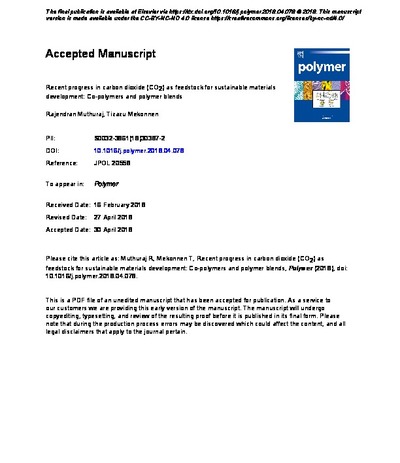| dc.contributor.author | Muthuraj, Rajendran | |
| dc.contributor.author | Mekonnen, Tizazu | |
| dc.date.accessioned | 2018-06-08 17:56:03 (GMT) | |
| dc.date.available | 2018-06-08 17:56:03 (GMT) | |
| dc.date.issued | 2018-06-06 | |
| dc.identifier.uri | https://dx.doi.org/10.1016/j.polymer.2018.04.078 | |
| dc.identifier.uri | http://hdl.handle.net/10012/13385 | |
| dc.description | The final publication is available at Elsevier via https://dx.doi.org/10.1016/j.polymer.2018.04.078 © 2018. This manuscript version is made available under the CC-BY-NC-ND 4.0 license https://creativecommons.org/licenses/by-nc-nd/4.0/ | en |
| dc.description.abstract | Combustion of fossil fuels and many other industrial activities inevitably produces carbon dioxide (CO2) that is released into the atmosphere and is currently deemed to be among the major contributors to global warming. One of the prominent solutions proposed to mitigate global warming concerns from CO2, capture and storage (CCS), did not attract many CO2 emitting industries as expected, mainly because of economic reasons. On the contrary, environmental pollution concerns associated with plastic waste, and the demand for sustainable feedstock for their production constitute grand challenges facing our society with regard to the production and use of plastics. As a result, the materials science community is striving to generate sustainable and biodegradable plastics to substitute conventional synthetic plastics from resources that do not pose direct completion with food production. This manuscript aims to provide a general overview of the recent progress achieved in CO2 based polymers for sustainable biopolymers such as co-polymers, and polymer blends. The synthesis, material properties, processability, and performances of important CO2 based co-polymers are critically reviewed. Furthermore, a critical review of CO2 co-polymers as components of polymer blend with a focus on the most relevant CO2 based aliphatic polycarbonates, poly (propylene carbonates) (PPC), is conducted. | en |
| dc.description.sponsorship | Chemical Engineering Department and the Faculty of Engineering of the University of Waterloo - Startup Funding | en |
| dc.language.iso | en | en |
| dc.publisher | Elsevier | en |
| dc.rights | Attribution-NonCommercial-NoDerivatives 4.0 International | * |
| dc.rights.uri | https://creativecommons.org/licenses/by-nc-nd/4.0/ | * |
| dc.subject | Biodegradability | en |
| dc.subject | Biodegradable polymers | en |
| dc.subject | Carbon dioxide | en |
| dc.subject | Packaging | en |
| dc.subject | Poly (ethylene carbonate) | en |
| dc.subject | Poly (propylene carbonate) | en |
| dc.subject | Polymer blends | en |
| dc.title | Recent progress in carbon dioxide (CO2) as feedstock for sustainable materials development: Co-polymers and polymer blends | en |
| dc.type | Article | en |
| dcterms.bibliographicCitation | Muthuraj, R., & Mekonnen, T. (2018). Recent progress in carbon dioxide (CO 2 ) as feedstock for sustainable materials development: Co-polymers and polymer blends. Polymer, 145, 348–373. doi:10.1016/j.polymer.2018.04.078 | en |
| uws.contributor.affiliation1 | Faculty of Engineering | en |
| uws.contributor.affiliation2 | Chemical Engineering | en |
| uws.contributor.affiliation2 | Waterloo Institute for Nanotechnology (WIN) | en |
| uws.typeOfResource | Text | en |
| uws.typeOfResource | Text | en |
| uws.peerReviewStatus | Reviewed | en |
| uws.scholarLevel | Faculty | en |


